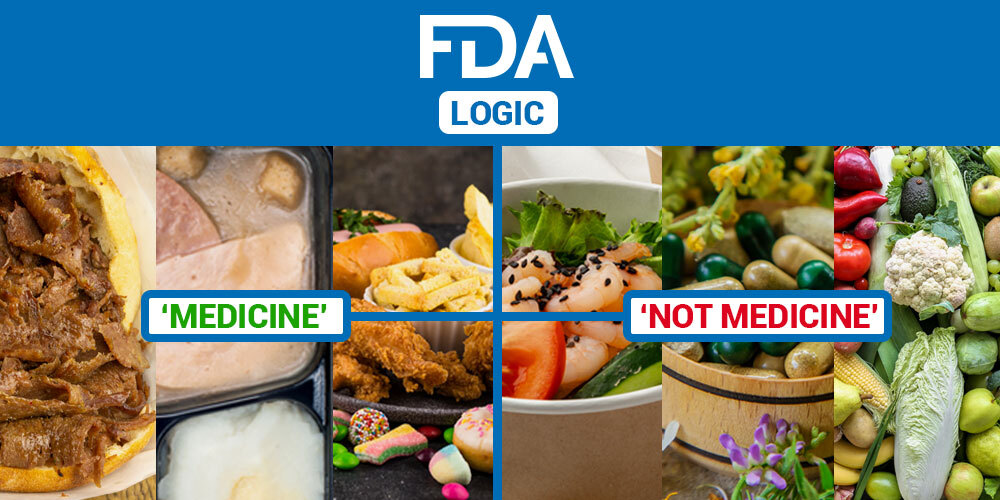While taxpayers, through the Medicaid program, foot the bill for ultra-processed junk food marketed as “medically tailored meals,” elsewhere the government severely restricts medical foods that truly embrace the idea that Food is Medicine. Action Alert!
Listen to the audio version of this article:
THE TOPLINE
- Medicaid dollars are being spent on “medically tailored meals” that are nothing more than ultra-processed junk food—like microwavable cheeseburgers—marketed to patients with serious conditions such as diabetes, cancer, and heart disease.
- While these harmful meals are greenlit, the FDA severely limits access to actual medical foods—nutrient-specific formulations shown to help manage or even reverse chronic illnesses—by restricting their approved uses to rare metabolic disorders.
- This policy double standard prioritizes corporate profits over patient health and leaves vulnerable Americans without access to truly therapeutic nutrition that could improve their outcomes and quality of life.
A Jimmy Dean breakfast sandwich or biscuits and gravy for diabetes? A 50-ingredient cheeseburger for cancer or heart disease? It sounds like a joke, but these are the real offerings of companies selling “medically tailored meals” to Medicaid patients…and making millions of dollars a year doing so. It’s all part of the perversion of the “food is medicine” principle that we’ve been writing about recently. The government is handing millions of dollars to companies feeding junk food to ill patients ostensibly to help manage their diseases. At the same time, current federal rules severely limit access to products like medical foods that can actually make a difference in our health. It’s another example of the rampant cronyism that dominates our health system and keeps us sick.
This is a critical issue. We’re living under a health system that has been deliberately set up such that only drugs can be “medicine”—that is, only drugs can claim to treat or prevent disease. But ancient wisdom and modern science tell a different story. We’re learning that true healing—not just symptom management—is something the body itself can accomplish with the treasure trove of foods and nutrients provided by nature. We need to fight for a healthcare transformation that recognizes the very real therapeutic effects that foods can have.
Medicaid Meals or Processed Profits? The Food-as-Medicine Farce
Because there is no universal definition of a “medically tailored meal,” companies can get away with selling what are essentially marked-up frozen processed meals to home-bound Medicaid patients. States set their own standards for the nutrition content of the meals. In many cases, the rules are as lax as simply requiring meals to provide one-third of the nutrients required in a day based on Dietary Reference Intakes (which themselves, as we’ve pointed out, are completely insufficient to optimize health).

There is a sad irony in these food companies selling a 50-ingredient, ultra-processed hamburger to sick patients claiming it can help them manage cancer, diabetes, renal issues, or heart problems when consumption of ultra-processed foods is associated with…diabetes, heart disease, and cancer.
Medical Foods: Could They Fix America’s Dietary-Related Health Crisis?
Over 40% of American adults now live with metabolic syndrome—including obesity, type 2 diabetes, and fatty liver disease—all strongly linked to poor diet. While drugs dominate treatment, a little-known FDA category called medical foods could offer a food-based alternative, grounded in science and used under medical supervision.
Medical foods aren’t drugs, supplements, or regular foods. They’re specially formulated to help manage a disease or condition with distinctive nutritional needs.
A medical food is defined by statute as follows:
a food that is formulated to be consumed or administered enterally under the supervision of a physician and which is intended for the specific dietary management of a disease or condition, for which distinctive nutrition requirements, based on recognized scientific principles, are established by medical evaluation.
Key features include:
- Use under a physician’s supervision
- Enteral (oral or feeding tube) administration
- No premarket drug approval required
- Legal ability to make disease-related dietary claims (unlike supplements or standard foods)
The category was first defined in 1988 under Section 5(b) of the Orphan Drug Act (21 U.S.C.§360ee(b)(3)), originally to help people with rare inherited disorders like PKU, where dietary management is critical. It was a smart legislative move to give a home to disease-specific nutritional therapies that didn’t fit into existing drug or food categories. But now our society is plagued with diet-related diseases that could certainly not be described as rare. Today’s metabolic crisis affects tens of millions, many of whom could benefit from targeted, science-based dietary interventions—without the cost and complexity of drug approval.
With greater awareness and regulatory clarity, medical foods could help close the gap between food and medicine—giving patients and practitioners more options to manage chronic disease through nutrition.
Sadly—and predictably—the FDA has seen fit to find ways of limiting use of the category to rare diseases. Its guidance, which requires that the FDA recognizes distinctive nutritional requirements for the conditions stipulated, as well as warning letters and other enforcement actions have served to greatly limit the number of products offered to the public under this category.
Real Food, Real Healing—Deliberately Out of Reach
The FDA says that medical foods cannot be used to treat diseases like scurvy, pellagra, and even diabetes (types 1 and 2)…that is, diseases that have the “distinctive nutritional requirements” that would make them perfect targets for medical foods. There has been research into the application of medical foods for chronic pain, insomnia, Alzheimer’s, depression, asthma, and many other conditions that would not qualify under the FDA’s draft guidance.
The absurdity of the situation created by the federal government is hard to miss. Food companies can hock ultra-processed garbage to sick patients, claiming they can help with heart disease, diabetes, and cancer. Yet medical food companies are shut out entirely from offering products that can help with anything other than rare inborn errors of metabolism? What are we doing?
Restricting medical foods has real consequences. Merely tweaking one’s normal diet is not sufficient to provide enough nutrients to correct certain conditions. Making a few changes to the standard American diet, without the support of medical foods, will almost certainly not be enough to manage conditions like diabetes or nutrient-deficient diseases.
A Better Way Forward: Food That Heals, Not Harms
One shining example of what’s possible when we embrace food as medicine comes from Erin Martin, gerontologist and co-founder of FreshRx Oklahoma, a prescription produce program launched in 2021. In response to worsening food insecurity and chronic disease in her hometown of Tulsa, Erin created a system that provides fresh, locally grown produce to patients with diet-related illnesses. By partnering with healthcare providers and local farmers, FreshRx helps improve patient outcomes while supporting regenerative agriculture and the regional economy. Erin’s work has become a national model for how food can be used not only to treat disease, but to build resilient communities, promote longevity, and reduce healthcare costs.
The federal government has lost sight of what it means for food to be medicine. Instead of embracing real, evidence-based nutrition therapies, it’s allowing Medicaid funds to be funneled into ultra-processed, disease-promoting meals while restricting access to medical foods that could genuinely support healing. This backward system keeps patients sick and dependent. It’s time to stop propping up a food-as-business model and start investing in food that heals. Tell your lawmakers: We deserve better than cheeseburgers for cancer.
Stay tuned: we’re preparing to launch a major campaign to expand the medical foods category—unlocking its potential to help tackle America’s growing epidemic of diet-related chronic disease.
If you believe in the power of food as medicine, please share this article with your network and join us in driving America’s natural health revolution.




